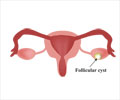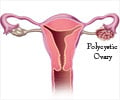Elevated testosterone levels in women linked to less diverse microbiome composition in the gut.
- Women with polycystic ovarian syndrome (PCOS) have a less diverse composition of bacteria in the gut.
- Women with PCOS are at risk for diabetes, infertility and psychological issues including anxiety and depression.
- Elevated testosterone levels associated with PCOS may be the cause of the less diverse microbiome.
Polycystic ovarian syndrome
PCOS is a hormonal condition that affects 7% to 10% of women of childbearing age, according to the Hormone Health Network. Women with PCOS have an increased risk of developing metabolic problems including diabetes. Reproductive issues like fertility and psychological issues including anxiety and depression are also common among women with PCOS. A diagnosis of PCOS requires at least two of the three key features of the condition:- Irregular or no menstrual periods
- Increased numbers of cysts in the ovaries called polycystic ovaries observed on the ultrasound
- Elevated levels of testosterone or clinical symptoms such as excess body hair
Study Overview
The research team set out to examine the effect of PCOS on the gut microbiome. The diversity of bacteria in the gastrointestinal tract play an important role in overall human health. Previous studies have indicated that there are significantly different gut bacteria in individuals with metabolic conditions such as obesity and diabetes compared to individuals who do not have those conditions.Upon analysis, the study found that the group of women who had PCOS had the least degree of gut microbiome diversity while women who did not have the condition had the highest degree of diversity. Women who had characteristics of Polycystic ovaries diagnosed by ultrasound had more microbiome diversity than women with PCOS, but less than women without PCOS.
"Like other metabolic disorders, PCOS is associated with changes in the composition of the microbiome," said the senior author, Varykina Thackray, Ph.D., at the University of California San Diego School of Medicine in La Jolla, California. "Our analysis indicates women with PCOS tend to have less diverse populations of gut bacteria, a trend which appears to be linked to elevated testosterone levels."
"Our findings suggest testosterone and other androgen hormones may help shape the gut microbiome," Thackray said. "These changes may influence the development of PCOS and the impact it has on a woman's quality of life. Additional research is needed to determine whether specific gut bacterial species contribute to the development of PCOS and whether the microbiome offers potential pathways for treating the condition."
Reference:
- Pedro J Torres et al, Gut Microbial Diversity in Women with Polycystic Ovary Syndrome Correlates with Hyperandrogenism, The Journal of Clinical Endocrinology & Metabolism (2018). DOI: 10.1210/jc.2017-02153
Source-Medindia
















